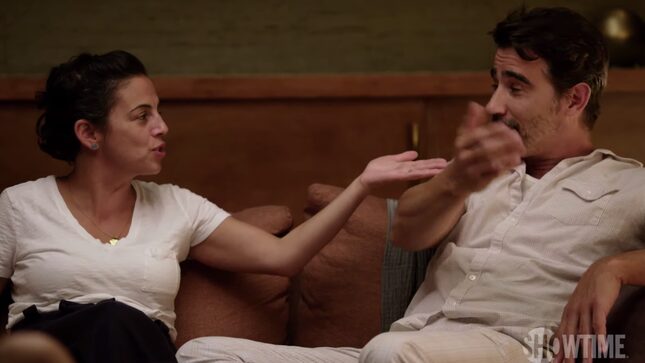
Screenshot: Showtime
A sort of cognitive dissonance sets in early on as you watch Showtime’s new documentary series Couples Therapy (which airs Friday nights on the channel, and is currently bingeable in its entirety on the Showtime app): Watching couples in crisis shouldn’t be this soothing. I blame the show’s couples therapist, Orna Guralnik, PsyD, whose serenity is strong enough to make her office feel positively womblike, even from your couch. I note the calming effect of tumult not to suggest that producers Josh Kriegman, Elyse Steinberg, and Eli Despres have erred in their presentation. Rather, it is to underscore that the slowly unfurling, compulsively watchable show manages to commodify discord in a manner that is equally voyeuristic and educational. The effect is something like reality TV with cauliflower puree snuck in.
Rarely is as much done, rarely are as many simultaneous sensibilities palpable, with so little. The Couples Therapy showrunners previously collaborated on the similarly multivalent knockout that was 2016’s Anthony Weiner documentary Weiner (Kriegman and Steinberg directed, Despres edited). Here, they’ve delivered a nine-episode series with a deceptively simple format: We follow four couples as they attend therapy sessions. And that’s about it. The counseling provides the meat of the episodes, which typically run less than 30 minutes and spotlight three highly emotionally articulate couples per week. According to The Guardian, Kriegman, Steinberg, and Despres, filmed the couples’ hourlong sessions over the course of 20 weeks and whittled it down from there.
The couples are so open with their feelings that they may floor you with their bravery.
The couples are so open with their feelings that they may floor you with their bravery. Their concerns run the gamut from petty to profound—they discuss sleeping proximity, whether one partner should be able to call the other at work, the great relief of open relationships, disparities in sexual desire, and of course, breaking up. The show is disarming in its matter-of-factness. With equal sensitivity and casualness, it approaches a topic as specific as the bottom surgery of Lauren, a trans woman in a relationship with a woman, and how the residual pain has interfered with her sexual pleasure. “I feel kind of incomplete and kind of… I feel very ashamed just kind of where I’m at down there,” Lauren tells the world with no seeming hesitation.
The show’s talky format (not unlike Esther Perel’s Where Should We Begin podcast) and loose narrative organization is reminiscent of the work of master documentarian Frederick Wiseman. It also may not satisfy those who want clear-cut, from-point-A-to-point-B storyline resolution. Some of the couples’ points of contention are presented at seeming random, only to be referred back to episodes later, as they connect to bigger-picture issues that reveal themselves over time. “He has a lot of birthday stuff,” Annie warns of her husband of 23 years, Mau, before they bicker over what she had planned for his birthday versus what he wanted. (“What I want is for her to do whatever I want without making it happen,” says Mau, moments after declaring himself “the easiest person to deal with.”)
The greater emotional truth is worth way more than he said-she said nitpicking.
A few episodes later, when Mau’s tumultuous upbringing is examined, he says sarcastically that he’s “still” waiting for his overwhelmed single mother to take him and his siblings to a pool as promised, his particular kind of neediness snaps into place for Guralnik and us. During a particularly heated session with Annie and the indefatigably pompous Mau, Mau dismisses Annie’s sexual insecurities as “all internal,” and then lashes out (and really, from what I can tell, lies) about what he meant by that. After, Guralnik reveals in a meeting with her advisor Dr. Virginia Goldner, that she feels she has to “sacrifice” Annie in order to keep Mau on board because “he’s so sensitive to… any diversion from the way he sees the world, he experiences it as such an assault.” Not so easy after all then, is he?
It is via these brief sessions between Guralnik and Goldner that the show generously and economically circles back and connects the dots for its viewers. These sessions also underscore certain themes, essentially telling you how to watch the show. At one point, Goldner reminds Guralnik that her job isn’t to take sides on whether these couples should break up or not. “Our job is to deepen the understanding of their dilemma,” she explains. And so the show does, at virtually every turn.
The splotchy portraits of the couples—rather decontextualized, rarely concerned with thorough blow-by-blow reporting—are revealed as ingeniously devised for dovetailing with Guralnik’s process. When Elaine and DeSean, married 11 years, have an argument about how they spend their leisure time—he says they went to brunch 17 weekends in a row and that she gets mad the one time they don’t, she says they haven’t gone to brunch together in months—Guralnik stops them in their tracks. “I work with couples a lot so let me see if I can save you the time of arguing about facts, about what happened,” she tells them. “It doesn’t work, like arguing, ‘Did it happen this way?’ ‘Did it happen that way?’ ‘Did we go 17 times or did we not go since August?’ You’re not gonna go anywhere with that kind of argument. Instead, let’s think about what’s really of importance to the two of you about this, what’s really the heart of it.” She encourages them to find a place of agreement regarding what’s going on with both of them, and to not get “polarized into your own extreme version.” That is, the greater emotional truth is worth way more than he said-she said nitpicking. What a radical idea for a medium like reality TV that thrives on such bickering, and what a lesson for viewers to take home.